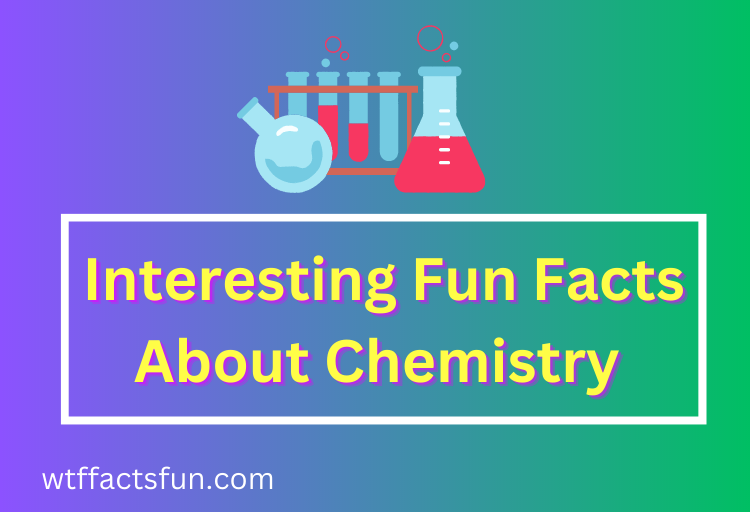
Table of Contents
Interesting Fun Facts About Chemistry
Interesting Fun Facts About Chemistry: Chemistry is the study of matter and the transformations it undergoes. It is a fundamental science that helps us understand the world around us, from the smallest particles to the largest structures in the universe. Here are some interesting facts about chemistry:
- Chemical reactions occur all around us, from the digestion of food in our bodies to the rusting of iron in the environment.
- Chemistry has been around for thousands of years, with ancient civilizations using chemicals to create medicines, dyes, and other products.
- The periodic table of elements, which organizes all known elements by their properties, was first created in 1869 by Russian chemist Dmitri Mendeleev.
- There are currently 118 known elements, with the most recent addition being tennessine in 2016.
- Chemical bonds are what hold atoms together in molecules, and there are three main types: covalent bonds, ionic bonds, and metallic bonds.
- Chemical reactions can be exothermic (releasing heat) or endothermic (absorbing heat).
- The study of carbon compounds is known as organic chemistry, and it is the basis for the chemistry of life.
- The discovery of penicillin, the first antibiotic, by Alexander Fleming in 1928 revolutionized medicine and saved countless lives.
- The study of chemical reactions that occur in living organisms is known as biochemistry, and it helps us understand how the body functions.
- Chemistry is involved in many industries, from pharmaceuticals and food production to plastics and electronics.
- Chemists use a variety of techniques to analyze and synthesize chemicals, including spectroscopy, chromatography, and mass spectrometry.
- The study of the behaviour of atoms and molecules in gases is known as gas-phase chemistry.
- Chemistry plays a crucial role in understanding and mitigating environmental issues, such as air and water pollution and climate change.
- The study of the behaviour of substances in solutions is known as solution chemistry, and it is used in many industries, including manufacturing and cleaning products.
- Chemists are constantly discovering new substances and developing new ways to synthesize and use them, which has led to many scientific and technological advances.
- The speed at which a chemical reaction occurs is influenced by factors such as temperature, pressure, and the concentration of reactants.
- The noble gases (helium, neon, argon, krypton, xenon, and radon) are named so because they are relatively unreactive and do not readily form compounds with other elements.
- The term pH is used to describe the acidity or basicity of a solution. A pH of 7 is neutral, while values below 7 are acidic and values above 7 are basic.
- The process of nuclear fusion is what powers the sun, as hydrogen atoms combine to form helium and release energy.
- The study of the rates and mechanisms of chemical reactions is known as chemical kinetics.
- The process of electrolysis involves passing an electric current through a solution to produce chemical reactions.
- Inorganic chemistry is the study of compounds that do not contain carbon, while organic chemistry focuses on compounds that do.
- The International Union of Pure and Applied Chemistry (IUPAC) is the organization responsible for establishing standardized names and symbols for chemical elements and compounds.
- Chemical elements are arranged in the periodic table based on their atomic number, which is the number of protons in the nucleus of an atom.
- A mole is a unit of measurement used in chemistry to represent a certain number of particles, such as atoms or molecules.
- The study of the behaviour of electrons in atoms and molecules is known as quantum chemistry.
- Chemical reactions can be reversible, meaning that they can go back and forth between reactants and products under different conditions.
- The study of the properties of matter and energy at very low temperatures is known as cryogenics.
- Chemical bonds can be broken by various methods, such as heat, light, or chemical reactions.
- Chemistry is a central science that connects with other fields such as physics, biology, and geology to help us understand the natural world.
FAQs (Frequently Asked Questions)
What are 3 facts about chemistry?
1. Chemistry is the study of matter, its properties, and its transformations.
2. Chemical reactions occur when atoms and molecules interact to form new substances with different properties.
3. Chemistry has applications in many industries and fields, including medicine, agriculture, energy production, and environmental science.
What is amazing about chemistry?
Chemistry is amazing because it explains the behaviour of matter at the atomic and molecular levels and allows us to manipulate and create new substances with a wide range of properties. This makes it essential to many fields, from medicine and technology to agriculture and environmental science.
Who invented chemistry?
Chemistry has evolved over time and has been studied by many ancient civilizations such as the Greeks, Egyptians, and Chinese. Thus, it cannot be attributed to a single inventor or discoverer. However, many consider Antoine Lavoisier to be the father of modern chemistry for his contributions to the field in the 18th century.
Final Words:
Chemistry is a fascinating and important field of study that impacts many aspects of our lives. From understanding the properties of everyday materials to developing new technologies and medicines, chemistry plays a crucial role in shaping the world around us.
Read also:
25 Fun Facts About Snails for Kids
14 Cinco de Mayo Fun Facts for Students